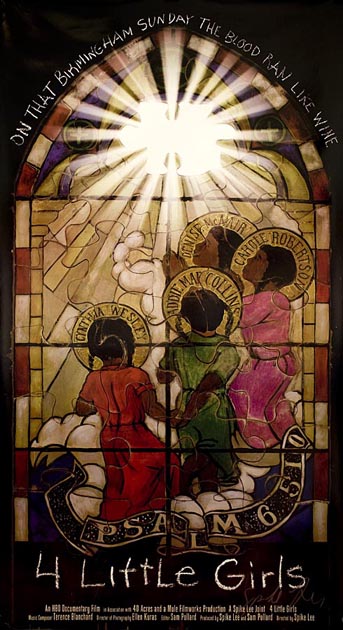Black History Month: Spike Lee's '4 Little Girls'
 Friday, February 27, 2015 at 4:21PM
Friday, February 27, 2015 at 4:21PM Our black history month coverage continues with Margaret on Spike Lee's 1997 nominee for Best Documentary Feature...
 Spike Lee is famously an Oscar loser. With every passing year--25 of them now behind us--it makes less and less sense that Do the Right Thing lost its nomination for Best Original Screenplay, let alone that it failed to earn Oscar nominations in the Best Picture or Best Director categories. When one thinks of Spike Lee, what comes to mind is a distinct stylization, and a reputation for incendiary cultural commentary. His inflammatory style has often been implicated as the cause of his cool reception from the film establishment.
Spike Lee is famously an Oscar loser. With every passing year--25 of them now behind us--it makes less and less sense that Do the Right Thing lost its nomination for Best Original Screenplay, let alone that it failed to earn Oscar nominations in the Best Picture or Best Director categories. When one thinks of Spike Lee, what comes to mind is a distinct stylization, and a reputation for incendiary cultural commentary. His inflammatory style has often been implicated as the cause of his cool reception from the film establishment.
His less remembered brush with Oscar was a nomination for Best Documentary in 1997 for his film 4 Little Girls, and that loss is more mysterious. No less artfully crafted or emotionally gut-punching than the best of his filmography, the documentary is also more formally and stylistically straightforward: other than the title card up front identifying it as "A Spike Lee Joint" it's absent many of the colorful hallmarks of the Lee's work.
The historical events examined by 4 Little Girls should be familiar to anyone who caught the recent Best Picture contender Selma. [Read more...]
Like that film, Lee's Oscar-nominated documentary covers key moments in Alabama during the African-American civil rights movement, focusing specifically on the 1963 bombing of Birmingham's 16th Street Baptist Church that killed four young black girls.
When Selma faced an inane wave of criticism for so-called historical inaccuracy, some of the film's defenders took up the line "well, it's not supposed to be a documentary," the implication being that a documentary is somehow more obligated to present fact unshaped by political perspective, to avoid what Ava DuVernay's defense of Selma's framing termed "an interrogation of history."
That is, of course, quite far from the case, and 4 Little Girls is a perfect case for why political perspective is not just acceptable but necessary in documentary film.
4 Little Girls is fueled by grief. It rages, and it keens, and it carries the viewer right along with it, despairing the human place that we could be in for this to happen. The movie's first four minutes, a simple pairing of archival footage with a full cut of Joan Baez singing "Birmingham Sunday," are as devastating as anything I've seen on film. If you can get that far without being moved to tears, you're stronger than me. The documentary is a lyrical eulogy for young lives taken too soon, a perspicuous portrait of a socio-political moment approaching its breaking point, and a furious indictment of hypocrisy and revisionism from the white establishment decades after the fact.
Perhaps the most mesmerizing passages in the film are its interviews with former Alabama Governor George Wallace--so notoriously unapologetic a segregationist that he's become an acceptable villain in the white political worldview-- who was clearly senile and effectively incoherent. The camera frames Wallace with a palpable derision as he sputters about the positive things he has done for black people and his "black best friend," a gentleman named Ed who appears to be a caretaker of some kind and, when called into frame, looks both apologetic and revulsed. A politically objective documentary (if there is such a thing) would surely not include this footage, and would be a weaker film for it.
The greatest emotional achievement of 4 Little Girls is in refusing to make its subjects into sweet, faceless symbols. The rhetoric of political martyrdom robs them of their names, but this movie insists on the specificity and individuality of Addie Mae Collins, Denise McNair, Cynthia Wesley, and Carole Robertson.
It's an incredible piece of filmmaking and an incisive examination of history, and that it lost the Oscar is deeply disappointing. That it lost to a documentary about the aftermath of the Holocaust-- right in the Academy's topical sweet spot-- is perhaps unsurprising. 4 Little Girls is available to stream for free on Amazon Prime, and on YouTube (via the Civil Rights Arts Project). If you care about the history, and you care about honoring the humanity of the victims of that history, you should watch it.



Reader Comments (5)
I have been meaning to see this one for juts about ever so thanks for the push.
For me, this is one of Spike Lee's best films as I hope he does more docs and get his mojo back into narrative-based filmmaking.
Sad. Angry. Sad.
Spike Lee created a timeless film about civil rights and grief. I remember seeing this on HBO, and feeling such a sense of loss and outrage. For anyone who has an interest in trying to understand that time period -go to You Tube now.
I will stick up for the Academy since It was a strong year for documentaries that year. The Oscar winner, "The Long Way Home" was excellent, as was "Waco - the Rules of Engagement". It would be a tough choice for an Oscar voter.
I didn't want to comment until I'd finished the movie. Now I don't have much to say beyond "wow." Great write up. Thanks for convincing me to watch.